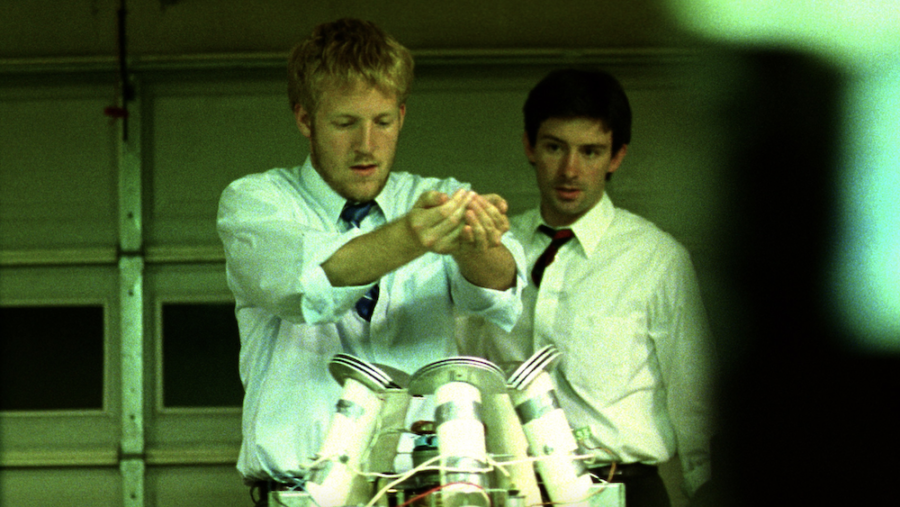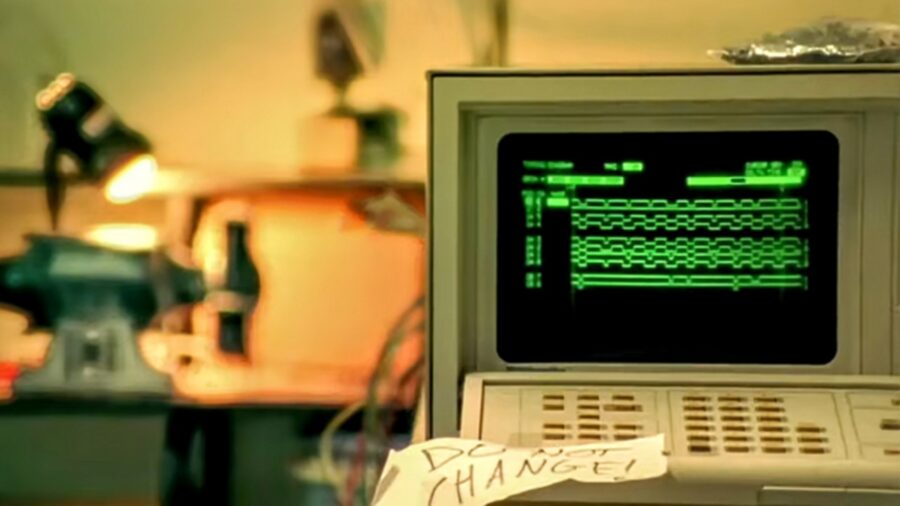Primer Movie Review

The story behind Primer is as nifty as the film itself, only costing a reported $7,000 and filmed on weekends. Shane Carruth wrote, directed, edited, and wrote the score. It won the Grand Jury Prize and the Alfred P. Sloan Feature Film Prize at Sundance, and Carruth was set to take on the world.
So when the next film he directed, Upstream Color, hit theaters, VOD, DVD, and Blu-ray in 2013, we looked back at Primer.
Here’s the deal with Primer. A completely fantastical idea, time travel, enters into the everyday world of two engineers, who then get themselves into a complex — though still quite simple, all things considered — web of details that unravels their lives in a way that has very rarely been put to screen before.
The proper release of Primer would be a back-to-back viewing of the same film, and with a 77-minute runtime, it is not as if a lot of time would be wasted. And it’s all about time.
Primer doesn’t talk down to its viewers or up to its viewers. Carruth plays Aaron, who partners with Abe (David Sullivan), Robert (Casey Gooden), and Phillip (Anand Upadhyaya) for a side project of selling JTAG cards.
Since it doesn’t matter what those are, Aaron and Abe create a device that seems to run without power, yadda yadda yadda, and allows a very specific brand of time travel. The very specificity and narrative P.O.V. viewers are given makes this film as much of a thriller mystery as a sci-fi drama.

The characters’ dialogue is never of the “Hey, how’s your day going?” variety; it unloads a lot of detailed information behind the ideas that the beyond-his-years Carruth is giving. And while you don’t need to understand every single thing being discussed to follow what’s happening, this film is layered like an onion, both in the story direction.
The juxtaposition is behind what we see and hear, and then what we finally come to understand about what we see and hear. Nothing is there by accident. Accidents aren’t accidents. Roses aren’t roses.
As with the brainiest of science fiction, Primer is best seen knowing very little, and some might say I’ve already given away too much. But spoilers that would cripple other films only give away a few things here.
I could theoretically tell you that Aaron [removed], which means that whenever Abe [removed] with the [seriously?], Aaron turned into a robot. Nah, that doesn’t happen, maybe. I’ll need to watch it for the twelfth time to really pick up on it.
Because Netflix has the little preview box above the time-marker when you move it, I passed through the entire film that way and wasn’t quite shocked to see just how slight the changes were overall.
With the focus on Aaron and Abe’s characters within a limited range of locations, the only aesthetic differences seem to be the camera placement and color palette since there are no big action sequences or explosions or CGI or anything like that.
This places all the emphasis on the story, and goddammit, it’s a strong one. Primer uses every trick within its limited production. Carruth’s electronic score carries the tone in a non-obvious way. A sentence is uttered that shifts how you’re viewing the conversation. You feel a tightening in your gut, and then you realize you’ve been holding it as long as the ambient note is in the background. And by you, I mean me.
I’ve never been paid to write about this film, which I obviously love quite a bit, so I guess I can give the film a few subjective jabs. The characters are plot-driven and aren’t necessarily fully fleshed out, although backstories are built into the plot, so character histories aren’t needed in such a short run-time.
That’s a backhanded compliment more than a negative criticism. With such a big idea at its core, the stakes are kept pretty low, and it’s possible not enough attention was given to certain aspects. But its independent creation explains both of those things away.
Multiple Primer viewings do not take away from the film’s successful pacing or the depth of the film’s events. And the angles of interpretation that new viewers will definitely want to voice. I end up forgetting a lot of the movies I watch, even some that I like because they don’t provoke further introspection once they’ve been seen.
Primer invites even the wackiest of conspiracy theorists to give their thoughts. If you’ve never heard of it, or if you’ve never thought it was worth the time, I implore you to watch it and you’ll thank me for it. I think my ear is bleeding.

REVIEW SCORE












